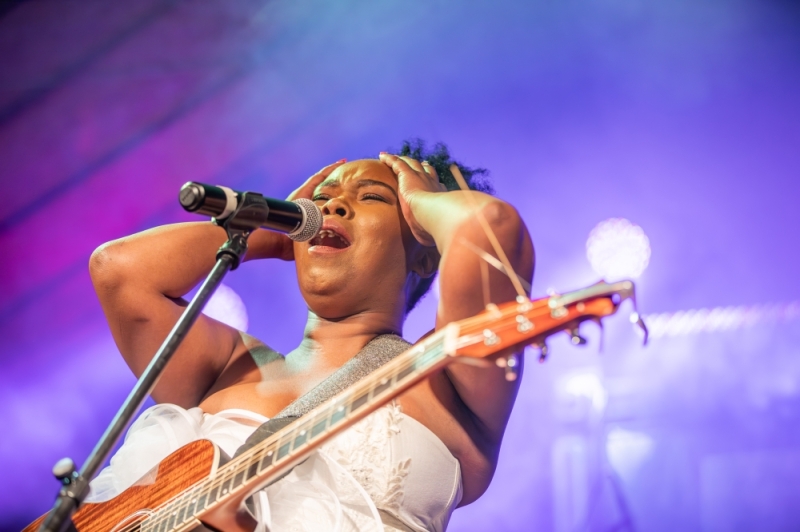The ‘Zahara Magic’ we will never get
Thalefang Charles | Sunday December 17, 2023 06:00


But this week, her flame sadly flickered out. While her music will undoubtedly live on, we will never get that special ‘Zahara magic’ that she used to exude while on stage.
Zahara could probably have come up a little sooner if Kalawa Jazmee’s producer, DJ Oskido had been more hungrier. On a Podcast With MacG this year, the legendary DJ, revealed how he missed out on an opportunity to ‘discover’ Zahara.
He described how he first experienced that distinct 'Zahara magic' when they met at an East London gig. He also said the young girl with a guitar, whose stage name was then ‘Spinach’, made great first impression that he immediately wanted to work with her.
Knowing that Oskido could be her ticket to a major musical breakthrough, ‘Spinach’ rushed home to fetch her demo CD to give to Oskido for consideration. But for some reason, Oskido says he never remembered to listen to the demo.
And so after about six months, when Lolilwe was almost a national anthem, DJ Zinhle, who was travelling with Oskido when they got ‘Spinach’s demo, reminded Oskido that, this ‘Lolilwe girl’ is actually that girl-with-a-guitar that they met in East London.
And that was when Oskido, after the horse has already bolted, took a listen to the demo CD. And from that demo tape, the first track was Lolilwe. She was now Zahara with the fastest selling album titled Lolilwe under TS Records. Zahara shot to fame at a time when the beautiful Xhosa songstresses from South Africa’s Eastern Cape were leading an African soul scene in Gauteng. This was almost a decade since the queen of African pop, Brenda Fassie left the scene.
The new Xhosa sisters on the scene were Simphiwe Dana, Zolani Mahola from Freshly Ground, Siphokazi Maraqana, Camagwini, Zonke, and they were all following in the path of Thandiswa Mazwai who switched from Kwaito and went solo with a new sound that incorporated elements of traditional Xhosa music, kwaito, mbaqanga, reggae, and gospel music. As the norm with every South African trending music, Zahara’s music reached Botswana. Even though most Batswana did not understand what she is saying in her songs, they jammed and sang along to it, reflecting the power of music. Zahara’s songs transcended through the borders, language barriers. Likewise, Batswana adored her music.
But I really became Zahara’s fan after watching her on stage and experiencing her ‘magic’. When she was up there, strumming her guitar, she bore her soul and demonstrated her devotion and connection to this music thing. It felt spiritual almost like church. When she hung down her guitar over her shoulder and sang to the mic, without playing the guitar, Zahara made magic. She would first transport herself into this almost tangible trance, before she enchanted the crowd with it, and together get lost in a song.
She would cry, with tears rolling down her cheeks. In the midst of all that musical haze, she would momentarily catch her breath and wipe off the tears and sweat, smudging her make-up before continuing again. And this magic act usually happened when she is performing the song Umthwalo.
When she sang, “Umthwalo wam uyandisinda, Ndiyacela ndiphathise” (My load is too heavy to bear, Help me carry it), even non-Xhosa speakers, could tell that she was begging for help. At times when the show happened after the death of someone that was close to her heart, Zahara used to do a special tribute for them. In December 2016, a day after gospel singer S’fiso Ncwane passed away, Zahara was a surprise act brought by the Standard Chartered Bank during their official opening of their branch at the Sir Seretse Khama International Airport in Gaborone.
It was relatively a small corporate crowd, and not really a music show, but she made a lasting memory of the music when she paid heartfelt tribute to Ncwane by playing the song Kulungile Baba. She cried throughout the tribute but continued singing and the intimate corporate function was at that point transformed into an emotional memorial service. Zahara’s best stage performance usually included a Brenda Fassie song. At Botswana Craft, where she used to be part of the regular line-up for Mascom Live Sessions, she used to get off stage and join the crowd to sing Brenda Fassie’s Vulindlela. She would disappear into the crowd and dance that traditional African pop dance formation with the audience.
As a photographer, Zahara was a dream subject to work with. She always dressed up for the show with some specially tailored dresses that gave her that fittingly diva image. Her face would be beautiful beat with some charming make-up. But at the end when she gets off stage she would be a mess like she was on some wrestling match.
This is because when that music trance hits her, Zahara would not care about her make-up or beautiful dress, she would dance, sweat and smudge her face into a beautiful mess that looks epic on festival pictures. And that is what we will never get. Her music will never die but we will never get that Zahara’s heartfelt moment when she is lost deep in a song. When tears roll down her checks, bearing her soul on mic in front of a mesmerised crowd, that has forever gone with Zahara. For those of us who have had the privilege to experience the Zahara magic, we will hold it dear in our memories. Thanks for the music. Rest in peace.
